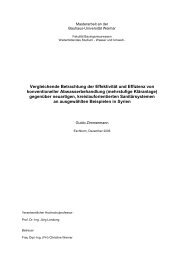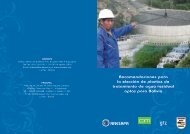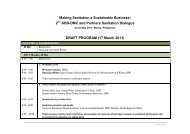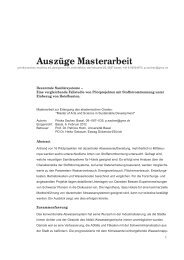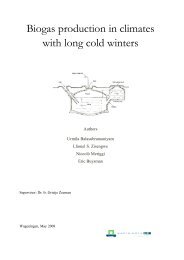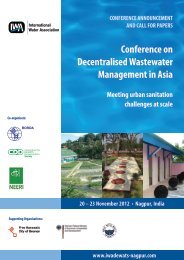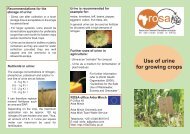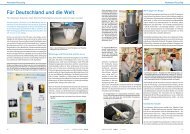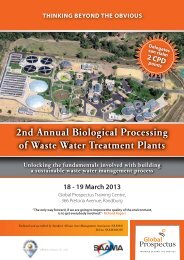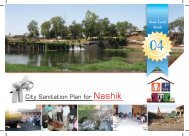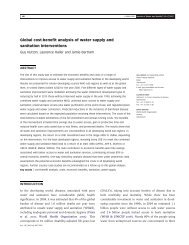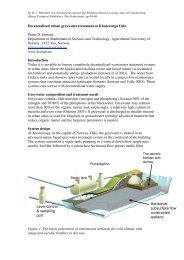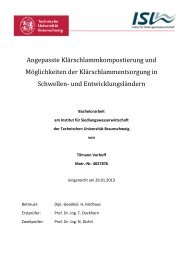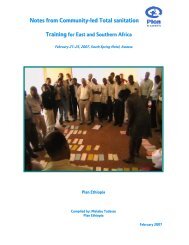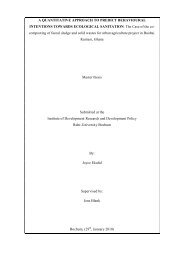Economic Effects of Sustainable Sanitation - SuSanA
Economic Effects of Sustainable Sanitation - SuSanA
Economic Effects of Sustainable Sanitation - SuSanA
Create successful ePaper yourself
Turn your PDF publications into a flip-book with our unique Google optimized e-Paper software.
Table 4: continued<br />
Stakeholder<br />
group<br />
Stakeholder Position<br />
(Comment)<br />
Organic<br />
One willing and one not<br />
producers willing to use urine and faeces<br />
as fertiliser<br />
Medium scale<br />
farmers<br />
Small scale<br />
subsistence<br />
farmers<br />
No willingness and capacities<br />
for being involved into the<br />
process <strong>of</strong> collection<br />
Willingness to pay for<br />
alternative fertiliser (rather<br />
dry than liquid)<br />
Would be willing to invest in<br />
infrastructure<br />
Would be motivated<br />
Would potentially be willing<br />
to use urine<br />
No willingness and capacities<br />
for being involved into the<br />
process <strong>of</strong> collection<br />
Do not use fertiliser in<br />
general. Willingness to reuse<br />
urine and faeces as fertiliser, if<br />
resources would be available<br />
No willingness and capacities<br />
to be involved into the process<br />
<strong>of</strong> collection<br />
Not willing and able to invest<br />
in storage and application<br />
infrastructure<br />
Would be motivated to use<br />
human excreta<br />
6.2.2 Logistics system design - implementation<br />
Reason<br />
(Comment)<br />
One would appreciate if it is<br />
transformed<br />
One would only accept it<br />
after being transformed into<br />
a safe solid fertiliser<br />
Want to focus on their own<br />
business<br />
Know about the value <strong>of</strong><br />
nutrients and are always<br />
interested in organic<br />
alternatives<br />
If it is economically feasible,<br />
yes. However, all decisions<br />
are based on economic<br />
reasons<br />
Finding alternative fertilisers<br />
according to their<br />
certification standards 54<br />
The product has to be<br />
competitive and easy to<br />
handle<br />
No spare time available.<br />
Some resources could be<br />
made available<br />
No need (partly) and no<br />
resources (generally)<br />
Neither spare time nor<br />
resources are available<br />
No resources are available<br />
Would like to produce<br />
marketable excess, to<br />
increase income<br />
Case Study Kampala<br />
Partner<br />
(Yes/No; Type)<br />
Yes/No<br />
(Consumer)<br />
Yes<br />
(Consumer)<br />
In comparison to the amount <strong>of</strong> nutrients excreted in faeces, urine is more valuable. Hence,<br />
when thinking about the reuse as fertiliser in agriculture, urine is more attractive and faeces<br />
can be considered a by-product. However, not only considering the reuse aspect, but also the<br />
54 The Uganda Organic Standard does not allow fertilisation with human excreta (NOGAMU, 2006). However,<br />
when exporting the products the certification standard <strong>of</strong> the export market is relevant.<br />
No<br />
54



